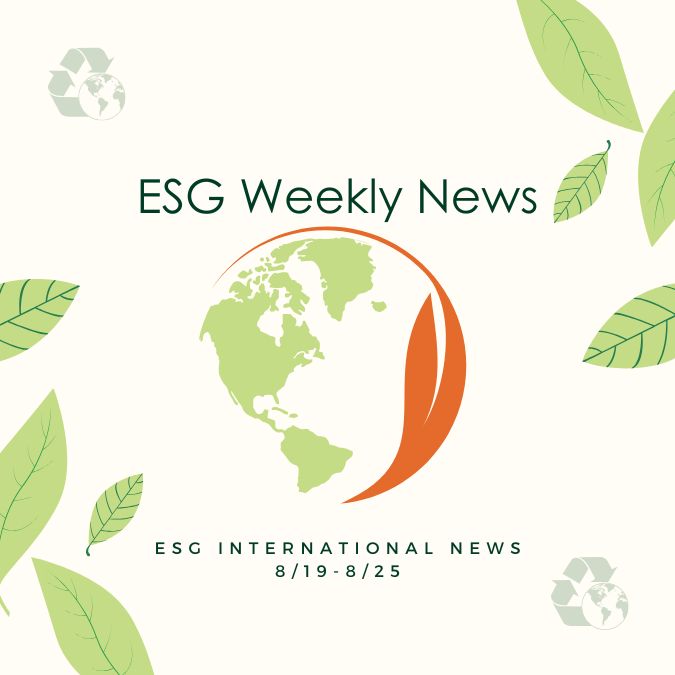- Home
- News
- ESG Weekly News
- ESG International Weekly 8/19 - 8/25
ESG International Weekly 8/19 - 8/25

1.China Launches Green Foreign Debt Financing Pilot to Accelerate Low-Carbon Projects
In August 2025, China’s State Administration of Foreign Exchange (SAFE) launched a pilot program in 16 regions, including Beijing, Shanghai, Hebei, and Qingdao, to attract global capital into green and low-carbon projects. The initiative allows non-financial enterprises to expand cross-border financing limits and simplifies foreign debt services to improve capital efficiency. SAFE emphasized balancing “openness and security” to drive high-quality real economy growth while positioning China as a key player in sustainable finance.
-
Scope: 16 provincial-level regions, including Beijing, Shanghai, Hebei, Qingdao
-
Beneficiaries: Non-financial enterprises channeling funds into green/low-carbon projects
-
Policy measures: Expanded financing limits, streamlined debt service procedures
-
Objective: Mobilize overseas capital to support decarbonization and strengthen sustainable finance leadership
“Going forward, the SAFE will ensure both openness and security, and further facilitate cross-border financing to support the high-quality development of the real economy,” the agency stated.
2.California Court Upholds Climate Disclosure Laws, Rejects Chamber Challenge
In August 2025, a federal court in California rejected a lawsuit by the U.S. Chamber of Commerce and business groups, affirming the enforcement of SB 253 (emissions reporting) and SB 261 (climate-related financial risk disclosure). The court ruled that SB 253’s emissions data is “purely factual and uncontroversial,” requiring only low-level scrutiny, while SB 261’s climate-risk disclosures—though more subjective—pass intermediate scrutiny given California’s investor protection rationale. With enforcement beginning in 2026, companies must prepare compliance systems, as these laws are expected to shape the future of ESG reporting in the U.S. and globally.
-
SB 253: Companies with >$1B revenue must disclose Scope 1 & 2 emissions in 2026, Scope 3 in 2027
-
SB 261: Companies with >$500M revenue must submit biennial climate-risk reports starting Jan 2026
-
Court rejected First Amendment claims; broader challenges under the Clean Air Act and Dormant Commerce Clause remain for trial in 2026
-
CARB to hold a public workshop on Aug 21, 2025, to clarify definitions and reporting expectations under SB 261
“Companies should be ready. This ruling signals that compliance is not optional—it’s imminent,” noted an environmental law partner in California.
3.LG Cuts Emissions and Plastic Use in Air Conditioner Manufacturing
LG Electronics has adopted foaming injection molding and material substitution to make its commercial 4-way system air conditioners more eco-friendly. The process reduces plastic use by nearly 900 grams per unit, saving 270 tons of plastic and over 4,400 tons of CO₂e annually. TÜV Rheinland certified that per-unit emissions have dropped to 14.85 kg CO₂e. LG is also switching from ABS to polypropylene (PP), which has a lower carbon footprint. The company plans to extend these methods across other AC lines while pursuing its broader target of cutting greenhouse gas emissions 54.6% by 2030 (vs. 2017 levels).
-
New method: Foaming injection molding cuts ~900g plastic per unit
-
Annual impact: 270 tons less plastic, 4,400 tons less CO₂e
-
Material shift: ABS → PP for lower emissions
-
2030 target: 54.6% GHG reduction from 2017 baseline
-
Rollout: Began with 4-way systems in June, expanding to more models
“The new material and manufacturing process underscores our dedication to sustainability. LG will continue to leverage innovative technologies to develop eco-conscious air conditioners for a healthier planet,” said Bae Cheung-hyun, head of the System Air Conditioners Business at LG ES Company.
4.Homeowners Rush Into Solar as 30% Federal Tax Credit Nears End
Residential solar demand in the U.S. has surged as homeowners rush to secure the 30% federal tax credit before it expires at the end of 2025. Originally slated to run until 2034, the credit was cut short under the 2017 Trump tax law. While leasing companies retain access until 2026, individual homeowners will lose eligibility this year. Installers report record sales, but warn of steep declines once the incentive ends. An EnergySage survey found that over 90% of installers expect negative impacts, with two-thirds predicting “dramatic harm” and one in four considering leaving the industry. Policy uncertainty—including tariffs and the fragile rollout of the $7B Solar For All program—adds further volatility. The outcome could heavily affect the roughly 280,000 solar jobs nationwide.
-
Policy backdrop: 30% federal residential solar tax credit ends in 2025
-
Short-term effect: Demand spiked 3–4x overnight as deadline looms
-
Industry concern: 90% of installers expect harm, 25% may exit industry
-
Market volatility: Tariffs and program uncertainty deepen risks
-
Job stakes: ~280,000 solar workers nationwide face uncertain future
“Solar provided means for someone like me to build a business from the ground up … but our own government is against our industry,” said Montana Busch, founder of Alternative Energy Southeast.
5.PepsiCo and Bold Reuse Introduce Reusable Cups at NFL’s Levi’s Stadium
PepsiCo, Bold Reuse, and the San Francisco 49ers launched a reusable cup program at Levi’s Stadium in California during an August 9 preseason game. The initiative, PepsiCo’s first with an NFL team, is expected to replace tens of thousands of single-use cups during the 49ers’ 10 home games this season. The move comes after PepsiCo dropped its 20% reuse target earlier this year but reaffirmed its broader packaging commitment: ensuring 97% of key market packaging is recyclable, compostable, or reusable. For Bold Reuse, this marks its California debut, building on partnerships at NBA and NFL venues and RFID pilots to track cup lifecycles.
-
Venue: Levi’s Stadium, San Francisco 49ers’ home field
-
Impact: Tens of thousands of disposable cups avoided this season
-
PepsiCo strategy: Ended 20% reuse target, now focusing on 97% circular packaging
-
Bold Reuse growth: First California project, with prior NBA/NFL partnerships and RFID pilots
-
Trend: Sports venues becoming testbeds for scalable circular economy solutions
“Advancing reuse requires collaboration and a systemic shift to help make the reusable option the most convenient and accessible,” said Burgess Davis, PepsiCo North America’s chief sustainability officer.
